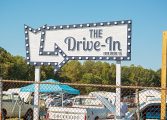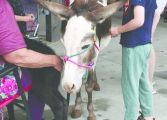The traveling salesman in those days were sometimes called peddlers and at other times drummers. I never learned the reason for the different titles, but I think that the peddlers traveled on foot or rode a horse and thus carried smaller items and quantities. My father traveled as a salesman for some time, and I think he was called a drummer. He used a horse and buggy and specialized in hardware, but sold a variety of goods including suits for boys.
The suits were made under the trade name of “Pony Boy Suits” and he gave away little billfolds that advertised the product. The billfolds had a picture of a boy dressed in one of the suits, and my father’s name and address embossed in gold lettering.
In those days, a traveling salesman could represent almost any company or product. Items were shown by samples and were not sold directly. Orders were taken and the purchased item would be sent later directly to the customer or to the salesman for delivery on his next trip. We had in our home a school desk that had been a sample in our fathers’ wares. We also had a number of neat cases that contained about 20 bottles of oil. The bottles were shaped like long slender test tubes and the oils were of different colors. The oils appeared to be for lubricating purposes but I can’t explain the variety or what they were used for. I have heard it suggested that one sideline included whiskey but can’t confirm that except to say that our attic used to contain a lot of whiskey bottles of many shapes, sizes, and labels.
The order taking and delivery procedure followed by the salesman took on rather ridiculous aspects with regard to items stocked in their vehicles. The Raleigh Man would bring into our house sample cases and baskets of items known to be in demand. He would show the goods, write down the order, then go back to the vehicle to fetch the stuff. The reason for this charade was that if items were sold directly a merchant’s license was required which was more expensive than a peddler’s license.
When motor vehicles became available and practical, the buggies were replaced with motor trucks, with the Raleigh Man still maintaining his yellow trademark. I also remember an itinerant merchandiser by the name of Mr. Watkins. He operated similarly to the Raleigh Man, but didn’t seem to come around as often and I believe he was a late comer to the business.
Our mother told us a lot of tales about our father’s drummer trips. On one trip, he was caught on the road during a violent storm and his horse and buggy took a severe beating from large hailstones. Another time he was passing a farmhouse near the road and saw a man beating his wife out in the front yard. Being the chivalrous gentleman he was, he stopped his buggy and got out to break up the beating. For his thanks, both the man and woman jumped on my father, beating him up and telling him to mind his own business.
On another trip during an epidemic of scabies, commonly known as the seven-year itch, my father was put into a hotel room with one double bed which he was supposed to share with a stranger. My father did not have the disease but he warned the other guys that he did. “Oh that’s all right,” the other man said. “I’ve got it too.” My father got out of that place and found lodging elsewhere with less cozy accommodations.
Country stores
It must have been about 1922, at the age of four, that I went to a store. It would have been at Enonville, about one half mile from our farm, and was operating together with the local post office. In prior years, it had been a fairly large store that served a number of families living nearby and since it was located at a crossroad, a lot of travelers would stop there to swap news, rest up, and buy whatever they needed. A barroom had been operated there at one time, which no doubt attracted clientele interested in alcoholic beverages to the chagrin of the local housewives.
In those days country stores were important because lack of convenient transportation precluded trips to the towns that had groups of retail establishments carrying specialized lines of merchandise. The typical country store would stock an amazing variety of items needed by country people. There would be food items in cans or packages, salt fish in barrels, nails in kegs, oil in barrels, cloth material in bolts, and always a showcase containing small items of hardware such as pocket knives, small toys, tobacco, and of course chewing gum and candy. The showcase would be located on a counter, enclosed with glass and with access only to the merchant on his side of the counter. It was not hard to see where small kids, and some not so small, would be found in the store.
Country stores tended to be one story structures in a rectangular shape, with double door entry and windows in the front end, and windows at the back end. They nearly all had false fronts like those shown in the western movies. Side windows, if any, would be small and near the ceiling to conserve shelf space. Counters would run the length of the building, usually one on each side. Heat would come from a potbelly wood or coal stove located near the center of the room. The stove would be insulated from the floor by a shallow box filled with sand that also served as a tobacco juice depository if the merchant did not provide more suitable receptacles. Peanut hulls also seemed to accumulate under the stoves in a lot of the stores.
The stove would be surrounded by a variety of chairs and other seating facilities such as nail kegs, stools, and homemade benches. Customers would gather there to rest before the trip back home, and some people would spend a lot of time there telling news, tall tales, jokes, and discussing politics. This activity was strictly a male domain. I never knew a female of any age to join this assembly.
Merchandise in the store would be displayed in about every way space allowed. Many items would be simply laid out on the counters, with additional stock stacked or piled underneath. A lot of things would be suspended from the ceiling. The cash drawer or till would be located at a convenient place where the merchant would wait on customers. A bell was arranged to ring whenever the cash drawer was pulled open, and sometimes there would be a combination of secret finger holes so that only the initiated could gain access. I always figured the bell was to alert the storekeeper if someone tried to rob the till while he was in another part of the building.
There were no adding machines, cash registers or calculators. Price totals would be listed on a scrap piece of wrapping paper or a paper bag. Brown wrapping paper came in large rolls and was dispensed from a metal rack on the counter that had a sharp hinged blade on which to tear off the length of paper needed. Regular customers usually kept their own cloth sack in which to tote home their purchases.
Most country stores would take eggs, butter, and even live chickens on trade and a lot of people stretched out their meager cash in that way. The merchants nearly always ran charge accounts for people they thought they could trust to pay, but they seldom turned away anybody who needed basic food items but had no money.
As a small boy, the candy and chewing gum stock drew most of my attention at the store. Candy would be in peppermint or horehound sticks, all day suckers, chocolate drops, and the one kind I didn’t like – peanut brittle. There were always soft drinks available too, not on ice, but you could drink them anyway. Coca Cola was popular, and there was also a chocolate malt drink called Mavis. NEHI came in several flavors. The drinks all came in glass bottles and were kept in wooden crates of 24 bottles each. The NEHI company had a unique way of advertising their product by picturing one of their bottles alongside a ladies leg, showing the bottle to be really knee high. I always thought it must have been a very small lady, but NEHI bottles did appear to be taller than competitive drink bottles.
There were country stores in Buckingham Courthouse, Arvonia, Andersonville, Curdsville, Arcanum, Alcoma, and other isolated areas of the county. The one called “New Store” earned a place in history, having been owned by Peter Francisco, legendary giant soldier of Revolutionary War fame. Very few of the old stores still operate today.
Dillwyn
As country roads improved and motor vehicles came into use, people started traveling to nearby towns to do their shopping. The towns had more and bigger stores and sold items not available in their country counterparts. Our nearest town was Dillwyn about 5 miles distant, with a population of some 900 inhabitants. There were several general merchandise stores and others that specialized in hardware, clothing, and farm supplies. There were also two drugstores, several restaurants, a doctor, a dentist, bank, hotel, barber shop, several law offices, and an undertaker.
As a small child, a trip to Dillwyn was a most exciting event. It was there I saw my first train while playing in the yard with some of my town cousins. The train scared me nearly to death. I didn’t know its travel was limited to the tracks and thought it might run through the yard killing us all. On another occasion, one of my older West Virginia cousins took a carload of kids to Dillwyn and bought us ice cream cones. I didn’t know what it was and thought I would take it home and eat it later, until they told me it would melt if I didn’t eat it right away.
The drugstores were popular places to visit. They had little round tables with metal chairs where you could sit and enjoy treats from the soda fountain. Fountain drinks were a real treat thought to be much better than bottled varieties. Chocolate milk shakes and ice cream sundaes were also very popular.
Long before juke boxes became the order of the day, one of the drugstores in Dillwyn had a player piano. It was similar to a juke box but played only piano music, and it was pot luck on the tune you would hear. It cost a dime to make it play and we usually had a long wait before someone came along with a dime to spend on such frivolous entertainment.
A movie theater was set up in an abandoned store building in the early ‘30s. It had only one projector so there would be a delay each time the reel had to be changed. Those were the days of the thriller serials. The story would reach a most exciting situation in which it seemed impossible for the players to escape death and destruction, and would suddenly halt to be continued next week, when the solution would be amazingly simple.
One of the grocery stores in Dillwyn was known as the “Red Front Market.” The other one was the A&P. To make purchases you stood at a cleared space at the counter and read off the items you wanted from a list or from memory. The grocery clerk would fetch the items as they were called out, list the prices, and sack up your purchases. When self-service groceries became popular about 1938, I would avoid them and try to find a store that still dispensed goods the old-fashioned way.




